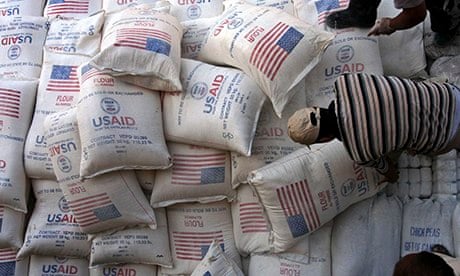With the US farm bill in the final stages of negotiation, time is running out for aid groups and the Obama administration, who are anxious to see changes to the country's international food aid programme, which they say is overdue for reform.
After 18 months of fitful negotiations, the farm bill – a five-year omnibus piece of legislation that covers a range of domestic and international policies – could become law before the end of December. The bill's provisions on international food aid, which are less controversial than some of its domestic programmes, may be decided early, though not announced before the entire bill is finalised.
The US Food for Peace international aid programme has remained largely unchanged since it was set up in 1954. While most donor countries buy food aid from local markets, the US – by far the world's largest supplier (pdf) – continues to send the vast majority of its support in the form of US-grown crops via American-flagged ships. This approach has been criticised for years in the US and overseas as costly, inefficient, and potentially disastrous for fragile local markets in poor countries.
In an interview, Nancy Lindborg, assistant administrator in charge of crisis response at the US Agency for International Development (USAid), said having a more flexible approach to food aid would make the programme far more effective. "We estimate very conservatively that with just modest increases in flexibility we could reach another 4 million children – without an increase in the [food aid] budget," she said.
Lindborg added that the humanitarian crisis in Syria had shown how important it was to have flexible and varied tools for delivering food aid. USAid had been giving Syrian refugee families vouchers to buy food at local markets in Jordan, she said, while the UN's World Food Programme (WPF) had been using credit card-like tools.
Food vouchers, which recipients can redeem at local shops, have given Syrian refugees "far more choice in what they want to feed their families and also support[s] local economies", Lindborg says. The voucher system, which contrasts starkly with the way in which the US has traditionally distributed its food aid, has "also helped mitigate tensions between refugee communities and local communities".
An increase in flexibility could come in the next farm bill if the reform advocates get their way. Changes may also be introduced to the controversial practice of "monetisation", where NGOs are given food aid to sell in local markets to pay salaries and fund their activities. A 2011 report (pdf) from the US government accountability office estimated that monetisation led to a 30% loss of taxpayer money over three years, suggesting it would be cheaper for the government to give NGOs cash instead.
Legislators from the Senate and the House of Representatives have met in recent days to negotiate a merger of the versions of the farm bill that each body passed this year. If a compromise were struck, the revised bill would go to the House and Senate for a final vote before being passed to President Obama.
The Senate bill includes changes to the food aid programme that would at least partly satisfy reformists. These include a small expansion of a pilot programme that allows food aid to be bought locally, as well as restrictions on the use of monetisation. The House version largely maintains the status quo, while eliminating local sourcing and actually encouraging organisations to monetise food aid.
"We're seeing a lot of intransigence on the part of the House in terms of getting anything done," said Eric Munoz, a senior policy adviser at Oxfam America. He admitted he was "not at all confident ... that the [final] bill will include the reforms to food aid that the Senate has proposed".
The Senate provisions marked a step in the right direction, said Munoz, but even if its reforms were adopted, they would amount to "only an incremental step toward where we ultimately need to go".






Comments (…)
Sign in or create your Guardian account to join the discussion